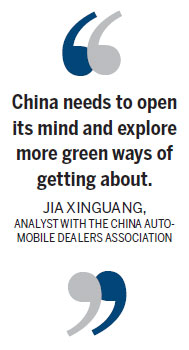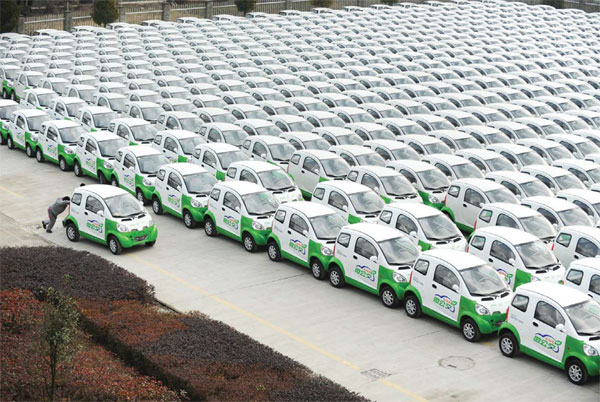China has the potential to be top market for electric vehicles
Updated: 2015-10-30 07:28
By Du Xiaoying(China Daily Europe)
|
|||||||||||
|
Electric cars at a factory parking lot in Changxing, Zhejiang province. In the first seven months of this year about 90,000 new energy vehicles were sold in China. Liang Zhen / For China Daily |
When China celebrated the 70th anniversary of the end of World War II on Sept 3, pictures of a spectacular pageant that included aircraft sweeping over Beijing were seen worldwide.
The skies that were the backdrop for this cavalcade and aerial show were a brilliant, clear blue, just as they had been 10 months earlier when world leaders gathered in the Chinese capital for the Asia-Pacific Economic Cooperation forum. In fact, local wags were so impressed by the celestial splendor their government had conjured up that they dubbed the phenomena "APEC blue" and "anti-fascist blue".
The country had proven once again that when it wants to achieve something it can and it does. That resolve is at the heart of an ambitious plan to bring clear, blue skies and clean, fresh air to cities nationwide on a more permanent basis in the years to come. One way of helping deliver them: electric cars.
The goal, to have 5 million electric vehicles on the nation's roads by 2020, thus making China a pacesetter in the field, is a tall order, but measures now being unfolded make it clear that the government means business. Such success will not only help rid big cities of smog, but also put the country on track to honor a pledge it made a year ago to reduce its carbon dioxide emissions per unit of GDP by 60 percent to 65 percent of the 2005 level by 2030.
About three weeks after the Beijing parade, the State Council, China's cabinet, issued a set of directives to speed up the adoption of what in China are called new energy vehicles. They include cars that are all-electric or battery electric as well as plug-in hybrids.
An executive meeting of the council called for more financial incentives to anyone using or considering buying new energy vehicles, for more research and development of those that use batteries and fuel cells, and for local governments to promote the purchase of new energy vehicles, including rescinding any measures deterring people from buying them.
On Oct 22, in another signal about how seriously the government takes the issue, Premier Li Keqiang called for greater efforts in upgrading the motor vehicle industry and said development of a fuel-efficient new energy vehicle industry will improve people's lives and inject dynamism to the economy.
Six years ago China surpassed Japan as the world's biggest carmaker. A year later it became the world's biggest car market, and the country's new energy car market now seems to be on the cusp of pulling off a similar feat. In the first seven months of this year about 90,000 new energy vehicles were sold in China, compared with about 63,000 in the US, the China Association of Auto Manufacturers says.
"China has the potential to be the world's largest electric car market," says Dong Yang, vice-chairman and secretary-general of the China Association of Auto Manufacturers. The country's new energy vehicle market is moving from a "primary stage" to a "fast-growing stage", he says.

Given that more than 23 million petrol-driven vehicles were sold in China last year, those numbers may seem minuscule, but the rise in sales appears to be gathering pace. Last year 74,800 vehicles were sold, triple the number the year before - as was the number of cars produced. Sales in the first seven months of this year rose 260 percent on the corresponding period last year.
All well and good, but in a groundbreaking field in which there are no set rules of the road to consult, making the motoring revolution of the early 21st century a reality is proving to be a huge challenge. That is evident in a target that the State Council set three years ago to have 500,000 new energy vehicles on the road by the end of this year, a goal that has proven to be way too ambitious.
One of the cities leading the charge in this campaign is Beijing. But as is the case with China's other big cities in this quest, it is encumbered by the need to balance conflicting interests - those of the public at large, of motorists and of companies eager to turn this revolution into a money-spinner.
If that is not enough for the municipality to grapple with as it coaxes people to buy electric vehicles, it must also keep a tight rein on the numbers. If it does not, all it will produce is more choke points on the capital's already choking roads.
On this matter the rise in the numbers of cars of the nation's roads over the past 20 years are eloquent. Last November the Traffic Control Bureau of the Ministry of Public Security said the country had 154 million privately-owned motor vehicles, double the number just five years earlier, and 10 times the number in 2000. Though thousands of kilometers of roads have been added to the national road network in that time, the growth in the number of motor vehicles has far outstripped their ability to cope.
Today's Top News
Two-child policy to add $12b in consumption
China to buy Airbus jets in $17b deal
China to allow two children for all couples
China's central bank dismisses QE rumor
Chinese premier holds talks with German chancellor
Refugee crisis continues to create rift between pro-Europeans, Eurosceptics
Rescue operations continue in quake-stricken Afghan provinces
Dutch King receives Dutch rabbit with Chinese characteristics
Hot Topics
Lunar probe , China growth forecasts, Emission rules get tougher, China seen through 'colored lens', International board,
Editor's Picks

|

|

|

|

|

|







